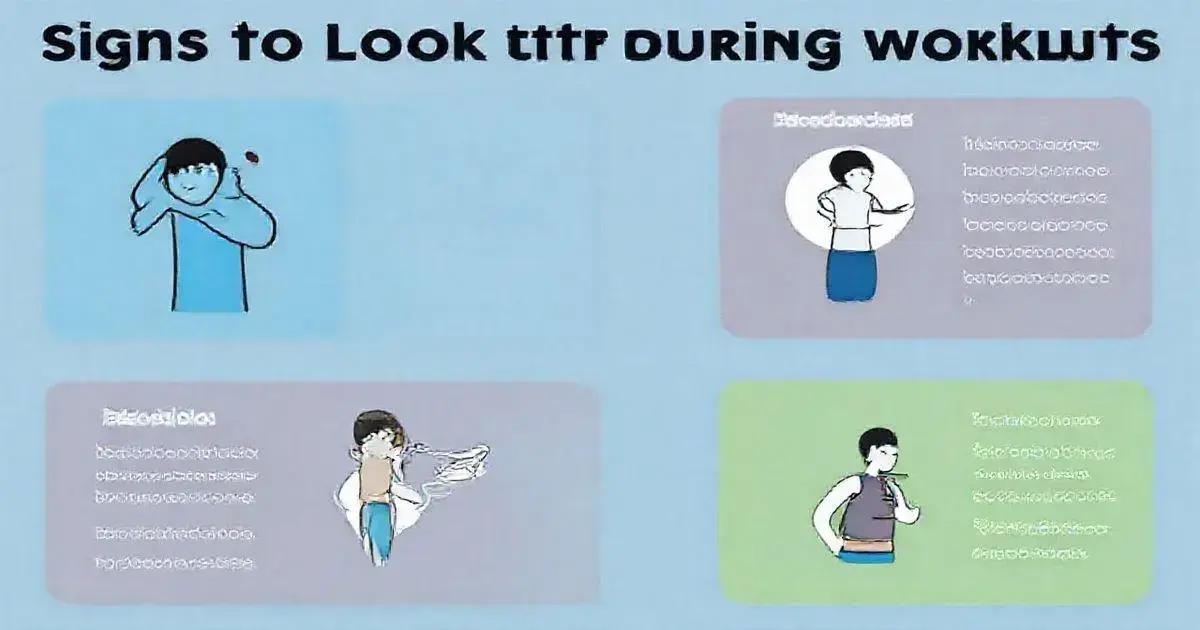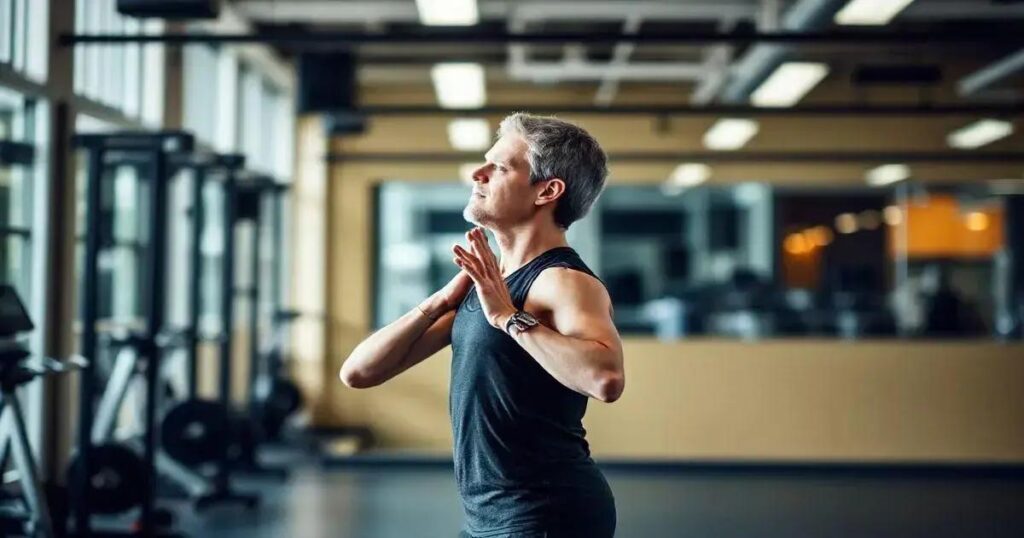Listening to your body during workouts is crucial for optimizing performance, preventing injuries, and enhancing recovery. Key practices include recognizing signs of discomfort, maintaining a workout journal, and regularly checking in with your physical and emotional states.
Listening to your body during workouts is essential for achieving optimal performance and preventing injury. Everyone’s body communicates different signals, and recognizing these can lead to better results. In this post, we will discuss the importance of understanding your body’s signals, common signs you shouldn’t ignore, and effective tips for listening during workouts. Prioritizing your body’s needs allows you to enjoy exercise while safeguarding your health.
Understanding Your Body’s Signals

Understanding your body’s signals is crucial when it comes to workouts. Your body communicates with you through various signs, letting you know what it needs. These signals are often physical, emotional, or mental. Recognizing them can help you optimize your routine and prevent injuries.
Physical Signals
Physical signals are perhaps the most apparent. They can include fatigue, discomfort, or even pain. For instance, if you feel a sharp pain in your knee while running, it’s a signal to slow down or stop. Ignoring this can lead to long-term injuries and setbacks. Additionally, muscle soreness is a normal part of working out, but if the soreness doesn’t fade, it may indicate that you have overexerted yourself.
Emotional Signals
Your emotional state during workouts can also signal how you’re feeling physically. If you find yourself consistently feeling unmotivated or stressed, it might be your body telling you to take a break. High-intensity workouts can release endorphins, but pushing too hard when you’re emotionally drained can be counterproductive.
Mental Signals
Mental clarity is essential during exercises. If you notice your focus waning or your mind wandering, this may be a sign that your body needs a rest. Mental fatigue can hinder your performance and increase the risk of accidents.
To effectively listen to these signals, keep a journal of how your body feels before, during, and after workouts. Over time, you will become more attuned to your body’s needs, allowing you to adjust your routines accordingly.
Common Signs You Shouldn’t Ignore

During workouts, certain signs should not be overlooked, as they can indicate potential issues. Here are some common signals that your body may be sending:
Sharp or Persistent Pain
If you experience any sharp pain or discomfort that doesn’t go away after a short time, it is crucial to pay attention. This can signal an injury that needs immediate care. Continuing to push through this pain can lead to more severe problems.
Dizziness or Nausea
Feeling dizzy or nauseated during or after exercise is often a sign of dehydration or overexertion. Ensure you stay hydrated before, during, and after your workout. If these feelings persist, it’s a warning that you may need to reduce intensity or duration.
Excessive Fatigue
Feeling unusually tired after a workout can signal that you are overtraining or not providing your body enough time to recover. Listen to your body’s fatigue cues and consider taking a rest day or engaging in lighter activities.
Shortness of Breath
While some breathlessness is normal during vigorous exercise, if you find yourself struggling to catch your breath, it could be a sign of an underlying condition. Always take these signals seriously, and consult a medical professional if they occur frequently.
Being aware of these common signs is vital for maintaining your health during workouts. The goal is to enjoy exercise, so taking your body’s signals seriously ensures you remain safe and active.
The Benefits of Listening During Workouts

Listening to your body during workouts offers numerous benefits that can enhance your fitness journey. Here are some key advantages:
Improved Performance
When you pay attention to your body’s signals, you can adjust your exercises to better match your energy levels and strengths. This leads to improved performance, allowing you to reach your fitness goals more efficiently.
Injury Prevention
Being aware of your body can help you avoid injuries. If you notice pain or discomfort in certain areas, you can modify your routine to prevent further damage, ensuring a safer workout experience.
Enhanced Recovery
Listening to your body helps you identify when you need rest. Planning rest days based on your body’s signals can facilitate faster recovery and lead to better overall results over time.
Greater Enjoyment
When you focus on how your body feels, you can tailor workouts to activities you enjoy. This increase in enjoyment makes it more likely that you will stick with your fitness regimen and maintain a positive attitude towards exercise.
Overall, the benefits of listening during workouts are significant. By aligning your exercises with your body’s needs, you enhance your training results and well-being.
Tips for Effective Body Listening

Listening to your body is an essential skill for anyone committed to a fitness journey. Here are some tips for effective body listening:
Keep a Workout Journal
Maintaining a journal can help you track how your body feels during different activities. Write down any pain, fatigue, or energy levels. This insight can guide your future workouts.
Regularly Check In With Yourself
During workouts, take a moment to check in with your body. Ask yourself how you feel physically and mentally. Knowing your state helps you adjust your routine appropriately.
Practice Mindfulness
Incorporating mindfulness techniques, like deep breathing and meditation, can improve your awareness of body signals. This heightened awareness allows you to better understand your needs and limits.
Modify Your Routine as Needed
Don’t hesitate to change your workout based on what your body feels. If you’re too tired for high-intensity training, switch to a lighter option like yoga or a brisk walk.
Learning to listen effectively takes time and practice but is crucial for achieving your fitness goals while maintaining your health. By following these tips, you can develop a deeper connection with your body.
Embracing the Importance of Listening to Your Body
Listening to your body during workouts is not just a matter of safety; it is essential for optimizing your fitness journey. By understanding your body’s signals, recognizing common signs you shouldn’t ignore, and implementing effective listening strategies, you can enhance your performance and well-being.
Prioritizing your body’s needs allows for improved recovery, better injury prevention, and greater enjoyment of your workouts. The connection between mind and body is powerful, and nurturing this relationship will lead to long-term success in your fitness goals.
Incorporate these insights into your routine, and you will find that your exercise experience transforms into one of awareness and fulfillment.
FAQ – Frequently Asked Questions About Listening to Your Body During Workouts
Why is it important to listen to my body during workouts?
Listening to your body helps prevent injuries, enhances performance, and allows for better recovery.
What are the common signs I should pay attention to?
Common signs include sharp pains, excessive fatigue, dizziness, and shortness of breath.
How can I improve my ability to listen to my body?
Keeping a workout journal and regularly checking in with yourself can significantly improve your body awareness.
What benefits can I expect from effectively listening to my body?
Benefits include enhanced performance, injury prevention, faster recovery, and greater enjoyment of your workouts.
Are there specific tips for body listening I should follow?
Yes, tips include practicing mindfulness, modifying your routine as needed, and observing your physical and emotional states during exercise.
What should I do if I experience pain during a workout?
If you experience pain, it’s essential to stop the activity, assess the discomfort, and seek medical advice if it persists.













